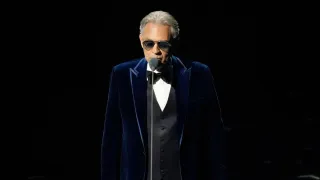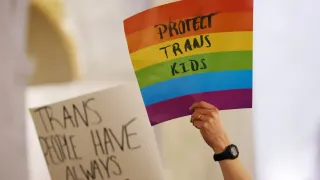February 18, 2024
'Oppenheimer' Wins Seven Prizes, Including Best Picture, at the British Academy Film Awards
Jill Lawless READ TIME: 4 MIN.
Atom bomb epic "Oppenheimer" won seven prizes, including best picture, director and actor, at the 77th British Academy Film Awards on Sunday, cementing its front-runner status for the Oscars next month.
Gothic fantasia "Poor Things" took five prizes and Holocaust drama "The Zone of Interest" won three.
British-born filmmaker Christopher Nolan won his first best director BAFTA for "Oppenheimer," and Irish performer Cillian Murphy won the best actor prize for playing physicist J. Robert Oppenheimer, the father of the atomic bomb.
Murphy said he was grateful to play such a "colossally knotty, complex character."
Nolan noted that nuclear weapons are "a nihilistic subject and the film inevitably reflects that," telling the movie's backers: "Thank you for taking on something dark."
Emma Stone was named best actress for playing the wild and spirited Bella Baxter in "Poor Things," a steampunk-style visual extravaganza that won prizes for visual effects, production design, makeup and hair and costume design.
"Oppenheimer" had a field-leading 13 nominations, but missed out on the record of nine trophies, set in 1971 by "Butch Cassidy and the Sundance Kid."
It won the best film race against "Poor Things," "Killers of the Flower Moon," "Anatomy of a Fall" and "The Holdovers." "Oppenheimer" also scooped trophies for editing, cinematography and musical score, as well as the best supporting actor prize for Robert Downey Jr., who played Atomic Energy Commission head Lewis Strauss.
Da'Vine Joy Randolph was named best supporting actress for playing a boarding school cook in "The Holdovers" and said she felt a "responsibility I don't take lightly" to tell the stories of underrepresented people like her character Mary.
"Oppenheimer" faced stiff competition in what's widely considered a vintage year for cinema and an awards season energized by the end of actors' and writers' strikes that shut down Hollywood for months.
" The Zone of Interest," a British-produced film shot in Poland with a largely German cast, was named both best British film and best film not in English – a first – and also took the prize for its sound, which has been described as the real star of the film.
Jonathan Glazer's unsettling drama takes place in a family home just outside the walls of the Auschwitz death camp, whose horrors are heard and hinted at, rather than seen.
"Walls aren't new from before or since the Holocaust, and it seems stark right now that we should care about innocent people being killed in Gaza or Yemen or Mariupol or Israel," producer James Wilson said. "Thank you for recognizing a film that asks us to think in those spaces."
Ukraine war documentary "20 Days in Mariupol," produced by The Associated Press and PBS "Frontline," won the prize for best documentary.
"This is not about us," said filmmaker Mstyslav Chernov, who captured the harrowing reality of life in the besieged city with an AP team. "This is about Ukraine, about the people of Mariupol."
Chernov said the story of the city and its fall into Russian occupation "is a symbol of struggle and a symbol of faith. Thank you for empowering our voice and let's just keep fighting."
The awards ceremony, hosted by "Doctor Who" star David Tennant – who entered wearing a kilt and sequined top while carrying a dog named Bark Ruffalo – was a glitzy, British-accented appetizer for Hollywood's Academy Awards, closely watched for hints about who might win at the Oscars on March 10.
The prize for original screenplay went to French courtroom drama "Anatomy of a Fall." The film about a woman on trial over the death of her husband was written by director Justine Triet and her partner, Arthur Harari.
"It's a fiction, and we are reasonably fine," Triet joked.
Cord Jefferson won the adapted screenplay prize for the satirical "American Fiction," about the struggles of an African-American novelist
Jefferson said he hoped the success of the movie "maybe changes the minds of the people who are in charge of greenlighting films and TV shows, allows them to be less risk-averse."
Historical epic "Killers of the Flower Moon," Leonard Bernstein biopic "Maestro," grief-flecked love story "All of Us Strangers" and class-war dramedy "Saltburn " all won nothing despite multiple nominations.
" Barbie," one half of 2023's "Barbenheimer" box office juggernaut and the year's top-grossing film, also came up empty from five nominations. "Barbie" director Greta Gerwig failed to get a directing nomination for either the BAFTAs or the Oscars, in what was seen by many as a major snub.
Britain's film academy introduced changes to increase the awards' diversity in 2020, when no women were nominated as best director for the seventh year running and all 20 nominees in the lead and supporting performer categories were white. However, Triet was the only woman among this year's six best-director nominees.
The Rising Star award, the only category decided by public vote, went to Mia McKenna-Bruce, star of "How to Have Sex."
Before the ceremony, nominees, including Bradley Cooper, Carey Mulligan, Emily Blunt, Rosamund Pike, Ryan Gosling and Ayo Edebiri all walked the red carpet at London's Royal Festival Hall, along with presenters Andrew Scott, Cate Blanchett, Idirs Elba and David Beckham.
Guest of honor was Prince William, in his role as president of the British Academy of Film and Television Arts. He arrived without his wife, Kate, who is recovering from abdominal surgery last month.
The ceremony included musical performances by "Ted Lasso" star Hannah Waddingham, singing "Time After Time," and Sophie Ellis-Bextor, singing her 2001 hit "Murder on the Dancefloor," which shot back up the charts after featuring in "Saltburn."
Film curator June Givanni, founder of the June Givanni PanAfrican Cinema Archive, was honored for outstanding British contribution to cinema, while actress Samantha Morton received the academy's highest honor, the BAFTA Fellowship.
Morton, who grew up in foster care and children's homes, said that "representation matters."
"The stories we tell, they have the power to change people's lives," she said. "Film changed my life, it transformed me, and it led me here today."
___
Hilary Fox contributed to this story.






